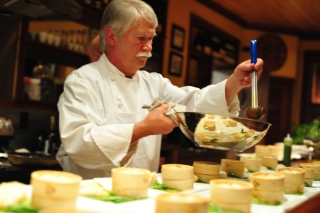
Ensuring a Positive Culinary Education Review
27 February 2023Educators must ensure graduates own essential aptitudes and attributes before donning the cap and gown.
By Paul Sorgule, MS, AAC
Feedback & comments: This email address is being protected from spambots. You need JavaScript enabled to view it.
Think about this: a positive review – in all cases – is our educational goal. How will our graduates be evaluated? How will our school’s reputation be determined? How will others view our effectiveness as teachers? We strive to properly prepare our graduates to be successful by demonstrating to employers they can function successfully in a restaurant or food-related business. We hope our graduates will have the confidence to step into a kitchen and fit into the rhythm of the operation and they in turn trust this will be the case. This is why we do what we do. This is why students and employers invest in our programs and why culinary programs exist.
What should we do to ensure a positive review occurs? We need to drill down and describe in detail the most essential graduate attributes and skills. We should insist on, focus on, become relentless advocates for, and promise all stakeholders we will guarantee every graduate owns these skills and attributes when they walk across the stage at graduation.
From my experience as a chef and educator and from countless conversations with chefs who hire or hope to hire graduates from culinary programs – this is what falls under the heading of: ABSOLUTELY ESSENTIAL.
Dependability: Employers expect graduates will show up on time (early), ready to work, and ready to hit the ground running. Chefs expect to give a task and it will be completed as defined.
Open to learning: Every chef and every operation is different. It is the chef’s prerogative to define how she or he wants things done. Employers are rarely interested in hiring a culinary graduate who thinks differently. Their opinions and methods will only count once they prove themselves on the job. Patience and a willingness to learn are essential traits of a young cook just starting.
Confident but humble: Chefs look for new hires who know what they know and are confident in their ability to accomplish foundational tasks. At the same time, there is little patience for confidence that can’t be backed up through action. Chefs respect young cooks who know their limitations and are willing to ask for help.
Respectful: Respect in the kitchen is like respect in the military. Respect for the chain of command, respect for fellow cooks and service staff, respect for the ingredients and equipment used, and respect for the processes in place.
Organized: Schools teach mise en place as it relates to workspace, but it applies to everything in the kitchen. How they keep their cook’s life organized from their prep sheets to their personal schedules, from their locker to their uniform. Chefs expect that mise en place is not a task, but rather an approach to life.
Honest and trustworthy: Chefs expect cooks will be honest beyond reproach. They can be trusted with expensive ingredients, tools, and sometimes money. There is little patience in a kitchen for anything other than honesty and trustworthiness.
Cleanliness: There is nothing more important in a kitchen than working clean and following the rules of sanitation and food safety. Zero tolerance for anything but cleanliness is the rule.
Hardworking: Chefs expect cooks will work physically and mentally hard – every day, all the time, no matter what.
Efficient: Wasted steps and wasted time cost an operation money and sets the stage for chaos. Efficiency is essential.
Cost conscious: Chefs expect culinary graduates will be very conscious of the small profit margins restaurants live within. They expect new hires will work to eliminate unnecessary waste, avoid costly mistakes, watch out for spoilage by properly rotating perishables, and follow procedures and standards to keep costs in line.
Exceptional knife skills: Always, always, always. This is the price of admission in the eyes of any chef.
Know the foundations: Cooking methods, product identification, building flavors, timing, and controlling degrees of doneness – this is, like knife skills, the price of admission into a kitchen.
Speak the language: Understanding cooking terminology and how a simple term can describe a more complicated process. As an example, a chef may simply say, “Braise those veal shanks for osso buco.” This will save the chef from detailing every part of the process including: searing, the addition of a caramelized mirepoix, deglazing, adding water or stock, seasoning, covering, and timing to make sure the product is fork tender and moist.
How are we ensuring graduates possess these aptitudes and skills when presented with a diploma? How are we teaching to make sure these essentials are reinforced every day, in every class? How are we evaluating these traits to make sure they are second nature with every graduate from our programs? How are we staying connected with chefs and graduates to make sure the confidence in these essentials is evident? This is our most important job, earning that positive review.
PLAN BETTER – TRAIN HARDER
Paul Sorgule, MS, AAC, president of Harvest America Ventures, a mobile restaurant incubator based in Saranac Lake, N.Y., is the former vice president of New England Culinary Institute and a former dean at Paul Smith’s College. Contact him at This email address is being protected from spambots. You need JavaScript enabled to view it..
